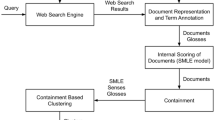Abstract
This contribution describes clustering of most informative keywords within full-text query results and its visualization in 2D or 3D space using so-called sociomapping. The main goal of the clustering is to help user with orientation in the term space and with the reformulating – more detail specification – of ambiguous queries. Test data were obtained from web search engines like Yahoo!, Google etc. To be able to evaluate quality of the used clustering method we have used 2 metrics to compare it with manually classified collection (Reuters Corpus Volume 1), moreover, the quality of preserving mutual distances of clusters from original multi-dimensional space was measured by Spearman’s rank correlation coefficient.
Preview
Unable to display preview. Download preview PDF.
Similar content being viewed by others
References
Liu, Y., Zhang, B., Chen, Z., Lyu, M.R., Ma, W.-Y.: Affinity Rank: A New Scheme for Efficient Web Search. In: WWW 2004, May 17–22. ACM, New York (2004), 1-58113-912-8/04/0005
Jenček, P., Höschl, C., Hudeček, J., Šebesta, J.: Mail Archiver Project, Software project documentation. Charles University, Prague (2009)
Höschl, C.: Sociomaps Visualisation, bachelor thesis, Charles University, Prague (in czech language) (2006), http://www.hoschl.cz/cyril/bakalarka/errata.pdf
Salton, G., Buckley, C.: Term weighting approaches in automatic text retrieval. Information Processing and Management 24(5), 513–523 (1988)
MacQueen, J.B.: Some Methods for classification and Analysis of Multivariate Observations. In: Proceedings of 5-th Berkeley Symposium on Mathematical Statistics and Probability, vol. 1, pp. 281–297. University of California Press, Berkeley (1967)
Wang, D., Yu, G., Bao, Y., Zhang, M.: An Optimized K-Means Algorithm of Reducing Cluster Intra-dissimilarity for Document of Clustering Advances. In: Fan, W., Wu, Z., Yang, J. (eds.) WAIM 2005. LNCS, vol. 3739, pp. 785–790. Springer, Heidelberg (2005)
Dunn, J.C.: A Fuzzy Relative of the ISODATA Process and Its Use in Detecting Compact Well-Separated Clusters. Journal of Cybernetics 3, 32–57 (1973)
Bahbouh, R., Warrenfeltz, R.: The Application of Sociomapping to Executive Team Development, http://www.hoganassessments.com/_hoganweb/documents/ApplicationOfSociomapping.pdf
Spearman, C.: The proof and measurement of association between two things. Amer. J. Psychol. 15, 72–101 (1904)
Borg, I., Groenen, P.: Modern Multidimensional Scaling: theory and applications, 2nd edn. Springer, New York (2005)
Author information
Authors and Affiliations
Editor information
Editors and Affiliations
Rights and permissions
Copyright information
© 2009 Springer-Verlag Berlin Heidelberg
About this paper
Cite this paper
Jenček, P., Vojtáš, P., Kopecký, M., Hösch, C. (2009). Sociomapping in Text Retrieval Systems. In: Andreasen, T., Yager, R.R., Bulskov, H., Christiansen, H., Larsen, H.L. (eds) Flexible Query Answering Systems. FQAS 2009. Lecture Notes in Computer Science(), vol 5822. Springer, Berlin, Heidelberg. https://doi.org/10.1007/978-3-642-04957-6_11
Download citation
DOI: https://doi.org/10.1007/978-3-642-04957-6_11
Publisher Name: Springer, Berlin, Heidelberg
Print ISBN: 978-3-642-04956-9
Online ISBN: 978-3-642-04957-6
eBook Packages: Computer ScienceComputer Science (R0)




